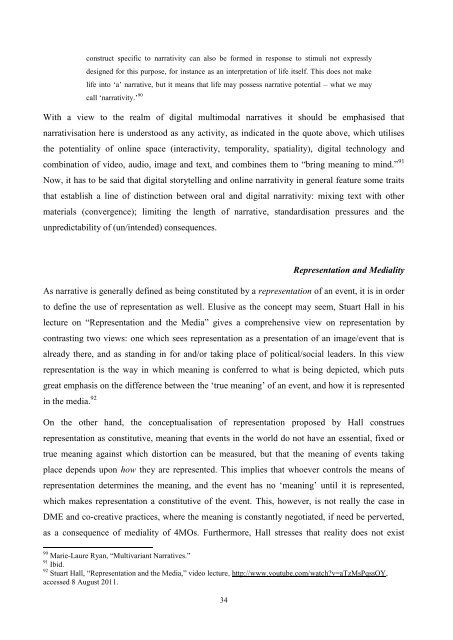UNIVERSITY OF NOVA GORICA GRADUATE SCHOOL ...
UNIVERSITY OF NOVA GORICA GRADUATE SCHOOL ...
UNIVERSITY OF NOVA GORICA GRADUATE SCHOOL ...
You also want an ePaper? Increase the reach of your titles
YUMPU automatically turns print PDFs into web optimized ePapers that Google loves.
construct specific to narrativity can also be formed in response to stimuli not expressly<br />
designed for this purpose, for instance as an interpretation of life itself. This does not make<br />
life into ‗a‘ narrative, but it means that life may possess narrative potential – what we may<br />
call ‗narrativity.‘ 90<br />
With a view to the realm of digital multimodal narratives it should be emphasised that<br />
narrativisation here is understood as any activity, as indicated in the quote above, which utilises<br />
the potentiality of online space (interactivity, temporality, spatiality), digital technology and<br />
combination of video, audio, image and text, and combines them to ―bring meaning to mind.‖ 91<br />
Now, it has to be said that digital storytelling and online narrativity in general feature some traits<br />
that establish a line of distinction between oral and digital narrativity: mixing text with other<br />
materials (convergence); limiting the length of narrative, standardisation pressures and the<br />
unpredictability of (un/intended) consequences.<br />
Representation and Mediality<br />
As narrative is generally defined as being constituted by a representation of an event, it is in order<br />
to define the use of representation as well. Elusive as the concept may seem, Stuart Hall in his<br />
lecture on ―Representation and the Media‖ gives a comprehensive view on representation by<br />
contrasting two views: one which sees representation as a presentation of an image/event that is<br />
already there, and as standing in for and/or taking place of political/social leaders. In this view<br />
representation is the way in which meaning is conferred to what is being depicted, which puts<br />
great emphasis on the difference between the ‗true meaning‘ of an event, and how it is represented<br />
in the media. 92<br />
On the other hand, the conceptualisation of representation proposed by Hall construes<br />
representation as constitutive, meaning that events in the world do not have an essential, fixed or<br />
true meaning against which distortion can be measured, but that the meaning of events taking<br />
place depends upon how they are represented. This implies that whoever controls the means of<br />
representation determines the meaning, and the event has no ‗meaning‘ until it is represented,<br />
which makes representation a constitutive of the event. This, however, is not really the case in<br />
DME and co-creative practices, where the meaning is constantly negotiated, if need be perverted,<br />
as a consequence of mediality of 4MOs. Furthermore, Hall stresses that reality does not exist<br />
90 Marie-Laure Ryan, ―Multivariant Narratives.‖<br />
91 Ibid.<br />
92 Stuart Hall, ―Representation and the Media,‖ video lecture, http://www.youtube.com/watch?v=aTzMsPqssOY,<br />
accessed 8 August 2011.<br />
34

















